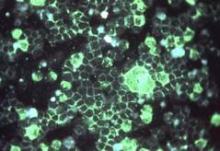In otherwise healthy preterm infants, palivizumab injections during the winter months to prevent respiratory syncytial virus also reduced the number of wheezing days by 61% for a full year, according to a report published online May 9 in the New England Journal of Medicine.
"Our study underlines the important role that RSV [respiratory syncytial virus] plays in the pathogenesis of recurrent wheeze. We hypothesize that RSV primarily causes direct pulmonary epithelial damage and local immunologic alterations in the lungs, leading to long-term airway hyperresponsiveness and wheezing," said Dr. Maarten O. Blanken of the division of pediatric immunology and infectious diseases, University Medical Center Utrecht (the Netherlands), and his associates for the Dutch RSV Neonatal Network.
Whether or not RSV plays a causal role in recurrent wheezing has been controversial. Dr. Blanken and his colleagues performed a double-blind randomized trial to further examine the issue.
They enrolled 429 preterm (gestational age, 33-35 weeks) but otherwise healthy infants at 1 university and 15 regional hospitals in the Netherlands during a 2-year period. All the babies were 6 months of age or younger at the start of the RSV season.
The babies were randomly assigned to receive either palivizumab (Synagis, MedImmune) (214 subjects) or placebo (215 subjects) injections during the winter months. Parents recorded airway symptoms, doctor visits, and the use of airway medications until the children reached 1 year of age.
Parents also were instructed to take nasopharyngeal swabs whenever the children developed respiratory symptoms that lasted more than 1 day, to be tested for the presence of RSV RNA.
As expected, the incidence of RSV-related hospitalizations was significantly lower among infants who received palivizumab immunoprophylaxis (0.9%) than among those who received placebo (5.1%). The rate of RSV infection requiring medical attendance but not hospitalization also was significantly lower in the immunoprophylaxis group.
The primary outcome measure of this study was the number of parent-reported days in which the baby wheezed during the first year of life. This was significantly lower in the active-treatment group (1.8% of days) than in the placebo group (4.5% of days), which is a relative reduction of 61%, the investigators said (N. Engl. J. Med. 2013 [doi:10.1056/NEJMoa1211917]).
In addition, the proportion of babies who developed recurrent wheezing was approximately half as high among those who received palivizumab (11.2%) as among those who received placebo (20.9%). The proportion who were given bronchodilator therapy was similarly lower in the palivizumab group (13%) than in the placebo group (23%).
Notably, the efficacy of immunoprophylaxis was not significantly different between children who had a family history of atopy (54% reduction in wheezing days) and those who did not (72% reduction in wheezing days). Palivizumab’s efficacy was similarly consistent whether the children’s parents had asthma (68% reduction) or did not have asthma (35% reduction).
Children in the RSV-prevention group were less likely than those in the placebo group to have adverse effects requiring hospitalization. There were 32 hospitalizations in 27 children (12.6%) in the palivizumab group, compared with 52 hospitalizations in 47 children (21.9%) in the placebo group, the researchers said.
"In this proof-of-concept study, treatment with a monoclonal antibody for RSV prevention in late preterm infants greatly reduced the number of parent-reported wheezing days during the first year of life, even after the end of therapy and outside the RSV season," Dr. Blanken and his associates said.
"Our results are in line with other studies that acknowledge the relationship between RSV bronchiolitis and recurrent wheeze," they said.
It is unknown whether these results can be generalized to term infants, they added.
This study was supported by an unrestricted grant from Abbott Laboratories and a grant from the Netherlands Organization for Health Research and Development to Dr. Blanken. Dr. Blanken reported conflicts of interest, and his associates reported ties to MedImmune and GlaxoSmithKline.


